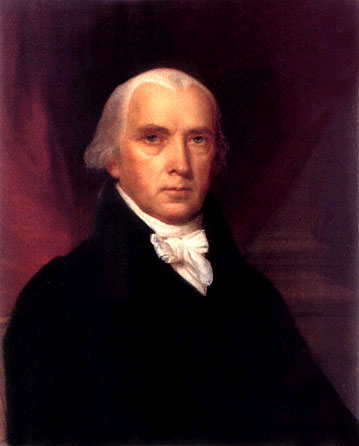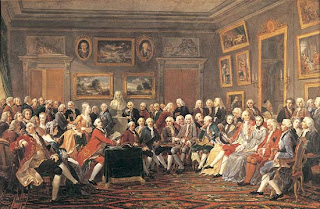
Brinkley p. 138-139/ Washington and Jefferson on Shays' Rebellion
In the late 1780s, a group of poor,
New England famers rebelled against the new taxes states were issuing to pay the war debts. The uprising was led by a former captain of the Continental army, Daniel Shays. New England's farmers were already heavily burdened by debt and believed they were being unfairly taxed by the corrupt wealthy. Shays demanded that the government issue more paper currency to help them pay their debts. He wanted tax reliefs, postponement of the payment of debts, and for the government to stop imprisoning people on account of their debt. This became known as the
Shays' Rebellion.
Just coming out of the
American Revolution, the colonists were still holding on to their ideals of liberty, opportunity and freedom, but understood that they needed a new system of government to control the recently independent nation. The people, however, were used to getting their way, and revolting when they felt they were being treated unjustly. The farmers, like the radicals under British control, felt paranoid about the taxation, thinking the worst about the people enforcing the taxes. Their rebellion soon became violent as Shays' followers used force to prevent taxes from being collected and intended to seize weapons. Were the states’ taxes as unjust as the British taxes?
While the British taxes on the colonies helped the British pay their war debts, the state taxes were set in place to gain a better economical standing in the world as a new nation. The British only wanted the colonies as a source of revenue for the mother country, but the states were trying to get America out of debt for a future of prosperity. The farmers were still only thinking of themselves individually, not as a new nation– just as the states were still very separated. This was the idea of "independence" to the extreme, but it became clear that a national constitution was needed to unify the weak, disjointed America in order for it to become prosperous and hold true to its founding ideals.
The followers of Shays' Rebellion were first going to be put to death, but were spared, and some of their demands were met. Their overall goal was not achieved, but the revolt made the government rethink how it was currently structured. The mercy by which the rebellion was received coincides with
Thomas Jefferson's belief about how an "unsuccessful rebellion" should be treated. He believed that a rebellion is "a medicine necessary for the sound health of government," meaning that societies need rebellions to question the existing government and affect change. He believed any rebellion justified.
George Washington, on the other hand was appalled at the rebellion, and wrote, "They (Shays' Rebellion) exhibit a melancholy proof of what our trans-Atlantic foe has predicted; and of another thing perhaps, which is still more to be regretted…" meaning that Britain might have been justified in controlling the colonies to an extent close to injustice–for people cannot be relied on to control themselves– evident by the rebellion. He also wrote, "If they have real grievances, redress them if possible; or acknowledge the justice of them, and your inability to do it in the present moment. If they have not, employ the force of government against them at once," meaning if what they are fighting for is beyond a petty problem, fix them. But if not, the rebellion should not be tolerated. Which point of view is more realistic? Jefferson's or Washington's?
Although Shays' Rebellion was one of the factors leading to the national constitution, the people revolting were over independent, bordering selfish, and were not justified to become violent. Jefferson’s idea of rebellion seemed a reasonable way for people to voice their opinions, but Washington knew the real damage a rebellion could cause (even though he thoroughly supported the American ideals of liberty and equal opportunity), and understood that there had to be some control over the people. He wanted to listen to the people’s opinions, but could not tolerate the violent way they were being presented.
 During the course of the French Revolution, there were many distinct phases that changed both the political and economic direction of the country. First, there was the political change of 1789, which included the desacralization of the monarchy and the creation of a constitutional monarchy, including elections to a newly formed National Assembly. However, as the Revolution progressed, radicalism became every more entrenched in French politics. This caused the National Assembly to disband, and a new Legislative Assembly formed, containing members of the Parisian Jacobin club, a younger and more radical group of politicians. Even later, however, an even more radical group of politicians, known as the Mountain, led by Maximilien Robespierre, controlled the newly formed National Convention, and employed dictatorial tactics to maintain control over the people. The Committee of Public Safety, set up by the National Convention and maintained by Robespierre and his compatriots, utilized effectively brutal techniques during a period known as the Reign of Terror, which eventually contradicted the fundamental principles on which the French Revolution began.
During the course of the French Revolution, there were many distinct phases that changed both the political and economic direction of the country. First, there was the political change of 1789, which included the desacralization of the monarchy and the creation of a constitutional monarchy, including elections to a newly formed National Assembly. However, as the Revolution progressed, radicalism became every more entrenched in French politics. This caused the National Assembly to disband, and a new Legislative Assembly formed, containing members of the Parisian Jacobin club, a younger and more radical group of politicians. Even later, however, an even more radical group of politicians, known as the Mountain, led by Maximilien Robespierre, controlled the newly formed National Convention, and employed dictatorial tactics to maintain control over the people. The Committee of Public Safety, set up by the National Convention and maintained by Robespierre and his compatriots, utilized effectively brutal techniques during a period known as the Reign of Terror, which eventually contradicted the fundamental principles on which the French Revolution began.














